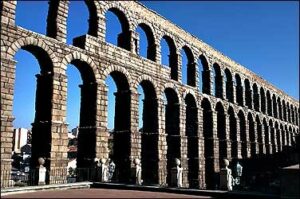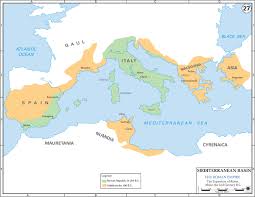Rome (unit 4)
Welcome to Rome! We will continue to improve our HTC skill of examining causes and consequences. We’ll practice progress and decline (part of continuity and change) and historical perspectives.
The Republic: Did Expansion Lead to Decline?
Introduction to Rome (slides)

Key Learning About the Republic:
privileges of Roman citizenship – who wanted them? who didn’t want to give them away to others? Why not? What was the potential for conflict?
government balance – how did they make a monarch-like power without the power of a monarch?
dictatorship: what’s the danger of this position?
sample key words: ‘balanced’ republic, consuls, tribunes, Senators, citizenship, patrician, plebeian, Romanization, triumvirate, rex, etc .
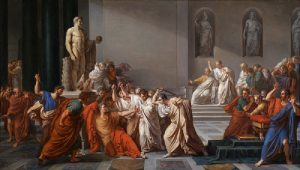
La morte di Cesare
- Complete Alternative Interpretations of Caesar_shortened (handout).
Caesar knew the Republic was no longer functioning, at least in the interests of anyone other than Senators. Was his solution to be emperor-like the best one?
Augustus – the First Roman Emperor but Not in Name
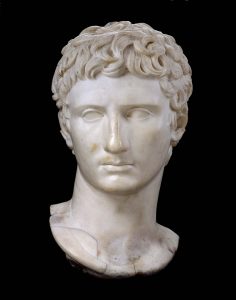
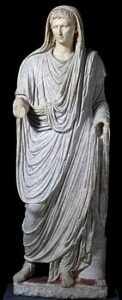
Bust of Augustus from the Museum of Fine Arts in Boston. late 30s or 40s CE. http://www.mfa.org/collections/object/augustus-151325
Augustus as Priest.
Minds On: What lessons did Octavian/Augustus have to learn from what happened to Julius Caesar? If ever there were a case of thinking fast (Caesar) and thinking slowly (Augustus). Augustus had to make sure not to repeat the mistakes of his adopted father – who was killed for his mistakes. In other words, did he go to far in making changes rather than assuring continuities?
Caesar-v_Augustus_PROJECTOR-slide (quotes)
“Make haste slowly.”
Augustus
Now let’s look at some of the things Augustus accomplished in his long rule and the different groups of people he had to satisfy in order to remain in power and alive.
CHW3M_Augustus_Worksheet_secondary_evidence
What do you think of Augustus’s character after doing this activity?
- smart,
- calculating
- cunning
- self-preserving
- other?
In terms of continuity and change, do you think Augustus balanced changes with tradition?
What is your interpretation of Augustus after each document? How does your view of Augustus change with the addition of each new piece of information?
Decline of the Roman Empire – generic factors
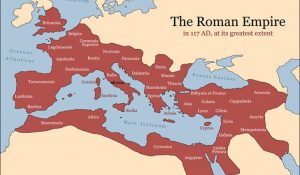
How did this all fall apart?
In specialized groups, read and annotate Decline of the Roman Empire articles (they are all pretty generic, without specific emperor names or dates). Then share with your mixed group and enter information onto the factors worksheet.
Empire overview of decline: Articles_Decline_Rome
Currency and the Collapse of the Roman Empire (infographic) = article 5
Analyzing the Causes of Decline:
In mixed groups, using the white boards, use only the names of the causes (economic, military, etc) and draw arrows between them. Indicate if arrows are direct or indirect causes.


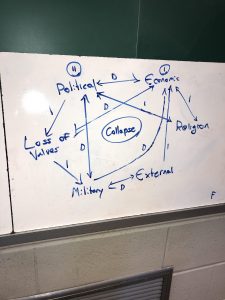
Debriefing Task (after looking at all groups’ whiteboards)
Identify #1 causal factor, and least important causal factor.
key words from each of the factors in decline:
- political
- corruption, disloyalty, fraud, conflict, political incompetence
- economic
- hyperinflation, heavy taxes, military spending, trade localization, unemployment, expensive infrastructure, gladiatorial games cost, trade imbalance (import more than export)
- religious
- Christian values conflicted with traditional polytheistic Roman beliefs and morality. It was a sudden change that resulted in confusion.
- social
- manumission (freeing) of slaves, loss of old Roman values of being a good citizen, reliance on slave labour made Romans behind in technology.
- external
- invasions, natural disasters and environmental decline (note that the army was mostly composed of Germanic peoples by the end, not Romans)
Timeline of Republic to Empire:
- 509 BCE start of the Republic
- 44 BCE death of Julius Caesar
- Augustus (ruled 27 BCE – 14 CE)
- Nero (ruled 54 – 68 CE)
- Trajan (ruled 98-117)
- Hadrian (ruled 117-138)
- Diocletian (ruled 284-305)
- Constantine (ruled 306-337)
- 476 CE end of the Roman Empire in the west (note that the eastern portion lasted until 1453)
Roman Emperors and Their Contributions to Decline
This activity is a way to quickly move from Augustus to the end of the Empire (in the west):
Each group will be given an emperor as their topic. Their job is to figure out to what extent this emperor contributed to the decline of the empire (if at all). In other words, who were the best and worst emperors?
- Nero
- Trajan
- Hadrian
- Diocletian
- Constantine
- (can add Marcus Aurelius, Caligula)
Here’s a sample presentation using Tiberius (an early emperor who took some actions that may have indirectly contributed to decline FAR after his rule).
For your emperor, use these note-taking sheets.
Each group will prepare a 5-slide presentation for the class in which they will argue why your emperor should be crowned the best (least contributions to decline) or the worst (most contributions to decline). The first slide should contain a one-sentence thesis.
On your slides, use green to show non-contribution to decline.
Use red for contribution to decline.
To self-check if you understand causes and consequences, use this tracking sheet.
For teachers only: this is a sample from 2019.
Challenge Ms. G on Her Interpretation of Augustus
Here’s an example of how I might make an argument about how Augustus did NOT cause the decline of Rome. It’s just an example to show you how to provide the connection to generic causes of decline (highlighted in red).
TS: Augustus did not directly cause the decline of the Roman Empire though he did establish some precedents that later became causes for decline.
Ex 1: Augustus’ treatment of the Senate was fair: he took away Julius Caesar’s old appointees, making the patricians feel happier about being rid of those plebeian-friendly old pals of Caesar. While the Senate remained somewhat powerful, Augustus grew to hold just as much power as he shared power over the provinces with the Senate. He personally owned and controlled Egypt, one of the wealthiest provinces.
Arg and HTC 1: This shows that Augustus was smart enough to please the Senate yet still give himself a lot of power. One of the long-term political causes of the fall of the Roman Empire in the west was the corruption of rulers. Over time the Senate became less and less important and more power was concentrated in the hands of the emperor who could be unscrupulous and devious. Even though Augustus never called himself emperor he certainly demonstrated emperor-like power when he removed the Caesar-friendly Senators and single-handedly decided that Egypt would belong to him. He wasn’t corrupt or devious; he was just smart enough to make it work in his time.
Ex 2: Augustus was very interested in reviving and promoting the old/traditional values of the Republic related to religion and family. He did this by pleasing the priests in many ways: taxing childless couples to push them to have more children; making an example of his daughter Julia by forcing her to marry to provide him with an heir and eventually exiling her for her immoral behaviour with men; building 82 temples in Rome.
Arg and HTC 2: These examples demonstrate that Augustus did not contribute directly to the decline of Rome in the area of religion because he promoted the polytheistic state religion of Rome, not Christianity. Christianity hardly existed at the time of Augustus. Later in the empire when the new religion began to spread amongst Romans, it grew and grew in popularity amongst plebeians who were suffering both socially and economically in the empire. It grew to the point that it made the polytheistic (or pagan) emperors upset when Christians would not sacrifice to the emperor. Persecutions increased until Constantine converted and gave a voice to Christians. Later, as Christianity became the state religion, people became confused and there was uncertainty as to the status of the old Roman values. Augustus cannot be blamed for this.
Ex 3: When it came to external and military affairs, Augustus can also not be seen as a direct cause of the fall of Rome. Though Augustus did spend money on troops and did send them to fight in many places, including against the Germanic tribes, he learned a lesson later in life that could have had a great effect on his successors: don’t expand. After losing legions against the Germanic troops, he wrote in his will that future emperors should not expand Rome because it was too dangerous.
Arg and HTC 3: Once again Augustus’ actions did not directly lead to the fall of Rome. It was not Augustus’ fault that later emperors, including his own immediate dynastic successors in the Julio-Claudian dynasty, did not heed his warning about the dangers of expansion. What later happened in the empire is that emperors expanded, causing them to have more and more troops to defend the frontiers. These troops were expensive to maintain. When Rome began to stagnate and emperors invited in Germanic troops to be paid to be in the Roman army, they might have foreseen that these troops would not be loyal to the Roman Empire. Augustus once again showed his smart mind by warning about the risks of expansion and thus should not be blamed for future emperors not seeing the consequences.
CS: For the most part Augustus is innocent of causing the later decline of Rome; the only thing he indirectly contributed to is gathering emperor-like power into his hands.
